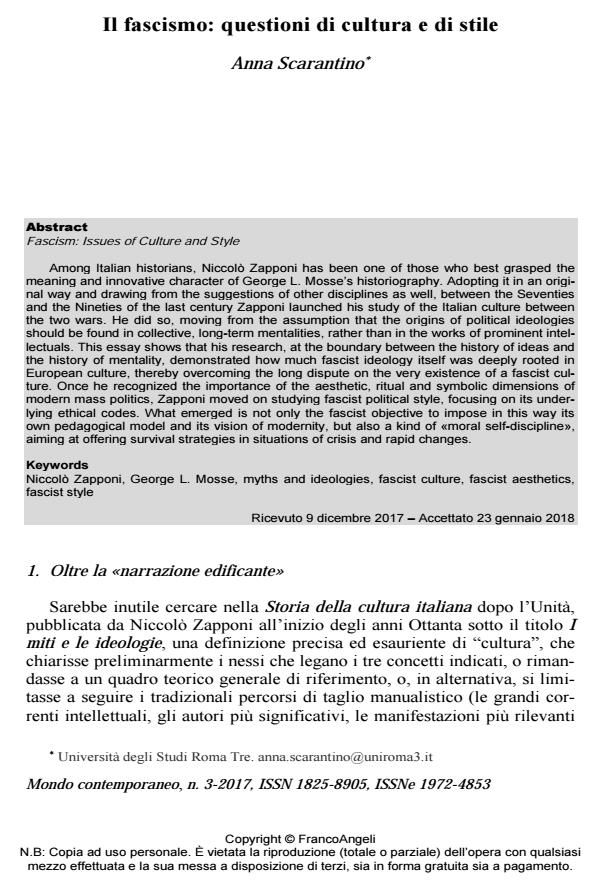Il fascismo: questioni di cultura e di stile
Titolo Rivista MONDO CONTEMPORANEO
Autori/Curatori Anna Scarantino
Anno di pubblicazione 2018 Fascicolo 2017/3
Lingua Italiano Numero pagine 26 P. 31-56 Dimensione file 307 KB
DOI 10.3280/MON2017-003003
Il DOI è il codice a barre della proprietà intellettuale: per saperne di più
clicca qui
Qui sotto puoi vedere in anteprima la prima pagina di questo articolo.
Se questo articolo ti interessa, lo puoi acquistare (e scaricare in formato pdf) seguendo le facili indicazioni per acquistare il download credit. Acquista Download Credits per scaricare questo Articolo in formato PDF

FrancoAngeli è membro della Publishers International Linking Association, Inc (PILA), associazione indipendente e non profit per facilitare (attraverso i servizi tecnologici implementati da CrossRef.org) l’accesso degli studiosi ai contenuti digitali nelle pubblicazioni professionali e scientifiche.
Among Italian historians, Niccolò Zapponi has been one of those who best grasped the meaning and innovative character of George L. Mosse’s historiography. Adopting it in an original way and drawing from the suggestions of other disciplines as well, between the Seventies and the Nineties of the last century Zapponi launched his study of the Italian culture between the two wars. He did so, moving from the assumption that the origins of political ideologies should be found in collective, long-term mentalities, rather than in the works of prominent intellectuals. This essay shows that his research, at the boundary between the history of ideas and the history of mentality, demonstrated how much fascist ideology itself was deeply rooted in European culture, thereby overcoming the long dispute on the very existence of a fascist culture. Once he recognized the importance of the aesthetic, ritual and symbolic dimensions of modern mass politics, Zapponi moved on studying fascist political style, focusing on its underlying ethical codes. What emerged is not only the fascist objective to impose in this way its own pedagogical model and its vision of modernity, but also a kind of «moral self-discipline», aiming at offering survival strategies in situations of crisis and rapid changes.
Parole chiave:Niccolò Zapponi, George L. Mosse, myths and ideologies, fascist culture, fascist aesthetics, fascist style
Anna Scarantino, Il fascismo: questioni di cultura e di stile in "MONDO CONTEMPORANEO" 3/2017, pp 31-56, DOI: 10.3280/MON2017-003003